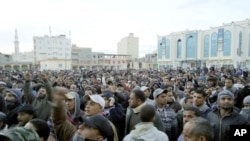The U.N. refugee agency is appealing to all governments to grant asylum to people fleeing violence and persecution in Libya. The UNHCR says it is gravely concerned about the dangers for civilians and especially for asylum-seekers and refugees inadvertently caught up in the violence.
U.N. refugee spokeswoman Melissa Fleming says her agency has no contact with the refugee community in Libya at this time. But she says the UNHCR is receiving very disturbing reports from its staff in Tripoli and from other third-party sources.
“One journalist passed information to us from Somalis in Tripoli who said they were being hunted on suspicion of being mercenaries,” Fleming said. “He says they feel trapped and frightened to go out, even though there is little or no food at home.”
The UNHCR has registered more than 8,000 refugees in Libya, with a further 3,000 pending cases for asylum. These people mainly come from Palestine, Sudan, Iraq, Eritrea, Somalia and Chad.
Fleming says many of the refugees, asylum seekers, and Libyan civilians are likely to flee from the turbulent situation reigning in Libya. She urges neighboring countries and the international community at large not to turn them away, but to treat them humanely.
“What is happening in Libya is extremely dramatic and it is violent and there are people who are going to be potentially fleeing for very legitimate reasons,” she added. “They are going to be vulnerable and they are going to require a safe haven.”
Meanwhile, U.N. human-rights chief Navi Pillay is calling for an immediate stop to the grave human-rights violations committed by Libyan authorities. Her spokeswoman, Ravina Shamdasani, says the High Commission is urging an independent international investigation into the violent suppression of protests in the country.
“Pillay cited the reported use of machine guns, snipers and military planes against demonstrators,” said Shamdasani. “She said such extremely serious allegations in brazen defiance of international law must not go without a full and independent investigation. Protection of civilians should always be the paramount consideration. Widespread and systematic attacks against the civilian population may amount to crimes against humanity.”
The U.N. Human Rights Office has reports of about 250 killed and hundreds wounded since the protests erupted last week in Libya, but it says it believes the actual numbers are probably higher.
The U.N. says many human-rights activists and journalists have been arrested, but no one knows where they are nor whether they are alive or dead.













